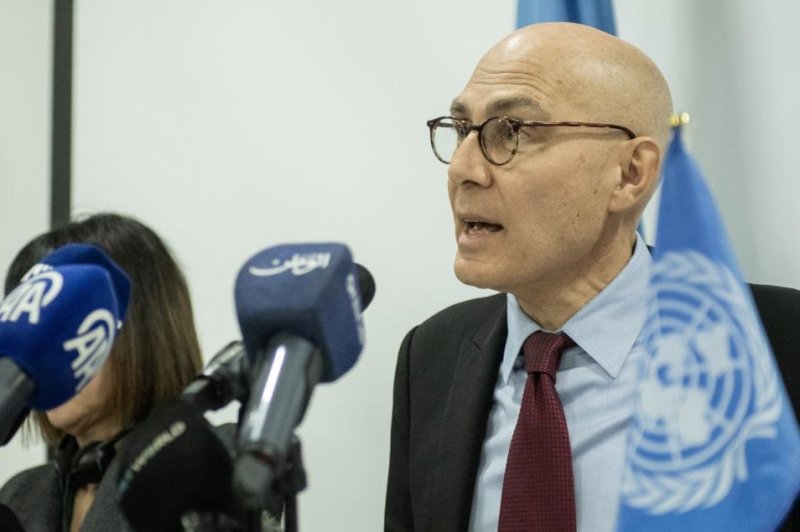United Nations High Commissioner for Human Rights Volker Turk speaks during a press conference in Damascus, Syria, on Wednesday, saying that the extent of atrocities committed in the country is hard to believe. Photo by Hasan Belal/EPA-EFE
BEIRUT, Lebanon, Jan. 15 (UPI) — U.N. High Commissioner for Human Rights Volker Türk said Wednesday that the extent of atrocities committed in Syria is hard to believe and emphasized that transitional justice is “crucial” after the overthrow of Syrian President Bashar Assad.
Türk, who described his visit to Damascus as “a historical first” after officials from the U.N. body and many other human rights groups had been denied access to the country under the Assad rule, said it was critical to address “the past wrongs” that have been committed by in Syria over the past five decades.
“The extent of the atrocity crimes truly beggars belief,” he said during a press conference in Damascus. “Those responsible for serious human rights violations and crimes must be held to account.”
He said “war crimes and even crimes against humanity” have been documented over the years of the Syrian conflict, stressing that “atrocity crimes,” which include enforced disappearances, torture and the use of chemical weapons, must be fully investigated.
“Justice must be served, fairly and impartially. … Revenge and vengeance are never the answer,” Türk said.
He said that as the country moves forward, “transitional justice is crucial” to promote the rule of law and reinforce respect for human rights in post-Assad Syria.
Türk noted that he met Syria’s new leader Ahmad Sharaa, who assured him of “the importance of respect for human rights for all Syrians and all different components of Syrian society.”
Since his Islamist rebels took control of most of the country and deposed Assad on Dec. 8, Sharaa has been seeking to reassure the various sects and minorities of their safety, rights and participation in rebuilding the war-ravaged country.
While the challenges facing Syria are “immense,” the U.N. official said the first task must be “saving lives,” with 90% of the population living in poverty and millions still displaced inside and outside the country.
He then called on the international community to urgently reconsider the lifting of the “sectoral sanctions” imposed on the country.
Assad’s fall revealed a shocking reality about tens of thousands of detainees when rebel forces stormed his regime-run jails in Damascus and other Syrian regions and freed them. However, a great number of them remain unaccounted for.
Türk, who visited the notorious Sednaya prison, where the U.N. body has been documenting violations for years, said one former soldier jailed on suspicion of being a defector told him of the “cruel treatment” he endured.
“I cannot even bear to share his stories of beatings and torture,” he said.
The U.N. top official also visited the residential neighborhood of Jobar, in Damascus, which he described as “an apocalyptic wasteland” in which no building was spared of bombardment.
“It is inconceivable that such mass killings and destruction took place. Equally, that banned chemical weapons were used against civilians elsewhere in the country, and not just once, says a lot about the extreme brutality of the tactics used by the former regime,” he said.
“Such acts constitute some of the most serious crimes under international humanitarian law.”
Türk warned that “still very real threats” exist because of the ongoing conflicts and hostilities that “must end.”
